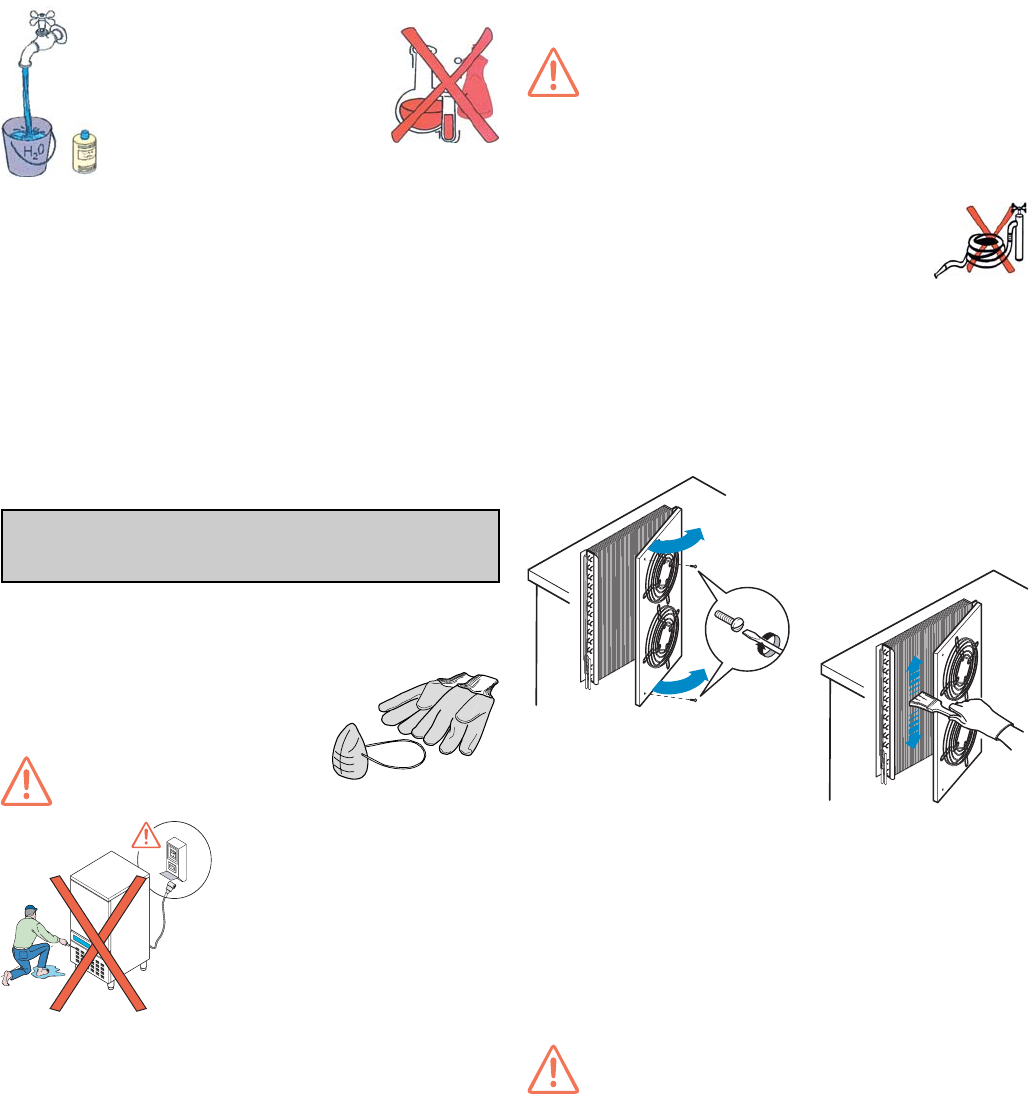
22
ATTENTION: the AOFP201RU4-201RU-202RU-202RU4 model
does not have a drain tray. Make sure the drain hole is connected
to the water drain system.
D.1.3 CLEANING THE FOOD (CORE) PROBE
Pay particular attention when handling the probe; remember
that it has a sharp point, therefore handle it with extreme care,
even in the cleaning phase.
You are advised to clean the food (core) probe periodically to
make sure the appliance works at maximum
efficiency.
The probe must be cleaned by hand,
using warm water and either neutral
soap or products that are over 90%
biodegradable (in order to reduce
the emission of pollutants into the
environment), then rinse thoroughly
with clean water and disinfectant
solution. Do not use solvent-based detergents
(e.g. trichloro-ethylene) or abrasive powders for cleaning.
ATTENTION: do not use boiling water to clean the probe.
D.1.4 PRECAUTIONS IN THE EVENT OF LONG PERIODS OF NON-
USE
If the appliance is not going to be used for a long period, take the
following precautions:
• Unplug the plug from the electricity mains socket.
• Remove all food from the chamber and clean the interior and
the accessories.
• Rub all the stainless steel surfaces vigorously with a cloth
slightly dampened with vaseline oil, so as to cover them with
a protective film.
• Leave the door partially open to allow the air to circulate.
• Air the premises regularly.
Non-routine maintenance tasks must be perfomed by an
AUTHORIZED SERVICE AGENT.
USE APPROPRIATE SAFETY GEAR
(GLOVES AND MASK) WHEN CARRYING
OUT ANY MAINTENANCE OPERATION.
ATTENTION:
do not touch the appliance if hands
and/or feet are wet. Before
performing any cleaning or
maintenance disconnect the
appliance from the electrical
source and carefully unplug the
appliance. Do not remove safety
guards. Wear protective gloves
when cleaning the condenser. Do
not use scissors, screwdrivers and
sharp objects on the cooling circuit.
D.2.1 PERIODIC CLEANING OF CONDENSER
The condenser can be cleaned with a brush, provided the
bristles are not in steel or a material that can compromise good
operation. Take maximum care not to bend the condenser fins,
as this would cause a reduction in the heat exchange.
If the appliance is to work efficiently, the chilling unit condenser
must be cleaned at least once every 3 months. If the appliance
is installed in a dusty or poorly ventilated environment the filter
must be cleaned more frequently, i.e. about once a month.
The condenser is located behind the front slotted panel. To
remove it, take out the two screws at the bottom and pull it
outwards to release it from the holding clips.
ATTENTION:
Before removing the slotted panel that protects the condenser,
make sure the appliance has been disconnected from the
power source.
Note: The technician is advised to use a brush or vacuum
cleaner to remove the dirt accumulated on the
condenser. Do not use pointed objects, as they may
damage the condenser.
ATTENTION: Do not wash the appliance by squirting
a jet of water on it.
D.2.2 CLEANING THE EVAPORATOR
Even in this case cleaning can be done with a brush, provided
the bristles are not in steel or a material that can compromise
good operation of the evaporator. Take maximum care not to
bend the evaporator coil fins, as this would cause a reduction
in the heat exchange.
To access the evaporator battery, proceed as follows:
• Disconnect from the power supply;
• Remove any trays from inside the chamber;
• Remove the 4 screws (2 in front and 2 behind) that secure the
two deflector plates to the evaporator guard;
• Remove the 2 screws that secure the inner inspection guard
and open it;
• Clean the evaporator battery with a brush or vacuum cleaner;
• Close the guard, refit the deflector plates and reconnect the
power supply.
ATTENTION:
Before opening the guard with tools, make sure that the
appliance is disconnected from the electricity mains.
D.2 MAINTENANCE TO BE PERFORMED
BY TRAINED PERSONNEL ONLY


















